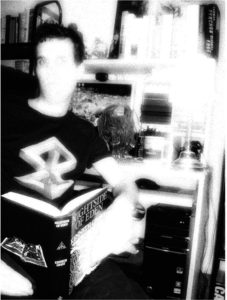
James Champagne
To me life in general seems to be very, very strange, and in the course of one’s span on this mortal coil it’s not uncommon to experience all manner of odd, uncanny and inexplicable events and phenomena that make a mockery of scientific logic and defy all rational explanation (this is especially true for those who dabble in the occult or who partake in religious practices). “The Universe is a Haunted House,” to quote a Coil song title. I suppose a pat answer would be that as far as I’m concerned “Speculative Fiction” is just an honest realism, or an effort to capture existence (human or otherwise) in all its eldritch and hydralike complexity (as opposed to Naturalism, which mainly concerns itself with a rational and Apolline portrayal of reality). Actually, I almost think that Joris-Karl Huysmans’ classification of a “Spiritual Naturalism” is a term that fits the genre better than “Speculative Fiction,” but that is, of course, a matter of personal opinion.
Many of the figurative veins that Speculative Fiction taps into and channels are Surrealism, the Irrational, Dreams and the Oneiric, Plutonian Mysticism, Depth Psychology, Angelic Chaos, the Astral Light: all emblematic of Creativity, Imagination, and Dionysian Ecstasy. It’s only natural that a sensitive and aesthetic dandy such as myself would be drawn to this particular medium of artistic expression!
I suppose the most natal influence would be the Holy Bible, or the bits and pieces that got transmitted to me during the church services of my childhood; virgins giving birth, water changing into wine, women transforming into pillars of salt, seven-headed dragons rising from the ocean like something right out of a Saturday afternoon Japanese monster movie, all of these things and more captured my imagination as a child and somewhat molded me into a vessel receptive to such influences from the Beyond. In a way the Bible was humankind’s first great Surrealist work of art. Around the same era I also read Alice’s Adventures in Wonderland for the first time… actually that was one of the very first books I ever read, which probably explains a lot. It seemed to me to be a more accurate portrayal of what the world was really like than most so-called “realistic” works of art.
Many of my books and stories, even those set in what we think of as the real world, often feature a sort of bleedthrough between dimensions, in which the rational waking world is invaded by the inhabitants of the Realms of the Unreal (to nick a phrase from Darger). As Arthur Machen wrote at the end of his story “N,” “I believe that there is a perichoresis, an interpenetration. It is possible, indeed, that we three are now sitting among desolate rocks, by bitter streams … And with what companions?”
In terms of dead writers (on the horror side of Speculative Fiction at least) I would cite H.P. Lovecraft, Arthur Machen, Clark Ashton Smith, William Hope Hodgson, John Bellairs, Poe (for the science fiction side you could say J.G. Ballard, Octavia Butler, William S. Burroughs, and sundry others)… regarding living writers working in the realm of horror, I think the Big Three are Thomas Ligotti, Ramsey Campbell, and Caitlín R. Kiernan, though I also rate very highly Mark Samuels, Reggie Oliver, J.R. Hamantaschen and Daniel Mills. Other living writers who work in the uncanny (be it horror, science fiction, fantasy, or just the generally unclassifiable) who I would recommend would include Stephen R. Donaldson (best known for his Thomas Covenant fantasy series, but I think his lesser-appreciated Gap Cycle is perhaps the greatest science fiction space epic ever written), Samuel R. Delany, Justin Isis, Quentin S. Crisp, Brendan Connell, Damian Murphy, Grant Morrison, Alan Moore, Junji Ito and various others who I’m sure I must be forgetting.